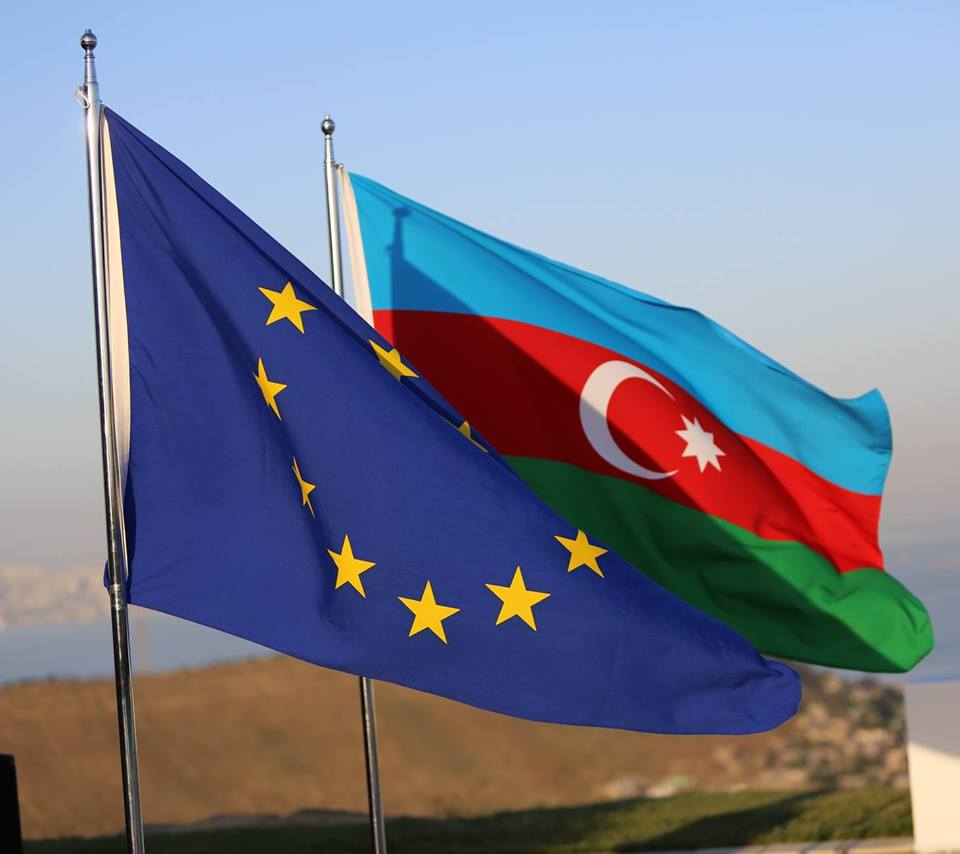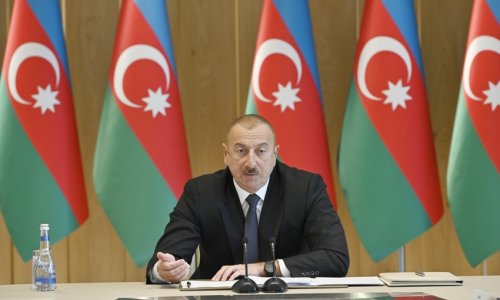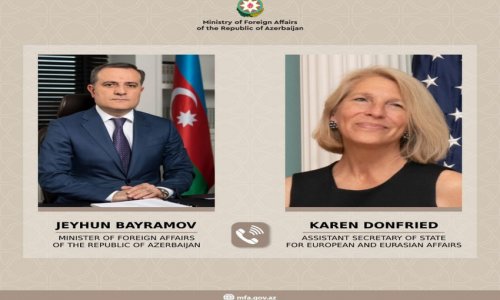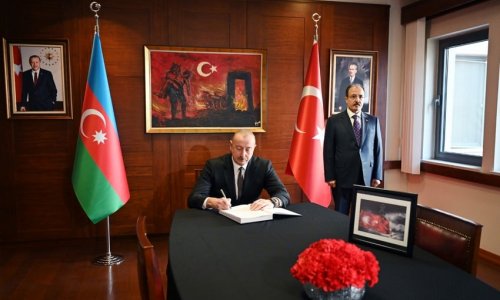By Georgi Gotev
Azerbaijan is the best example that the one-size-fits-all approach of the EU vis-à-vis its neighbours does not work, a Commission official admitted to an audience in Brussels.
"Many of the EU officials, and also in the member states, were used (to the idea) that everybody was keen to get an Association Agreement, and was keen of getting closer to the EU. And we were surprised that Azerbaijan did not want to,” according to Dirk Schuebel, Head of Division for bilateral relations with the Eastern Partnership countries of the European External Action Service, speaking at a conference organised by the EPC, the European Policy Centre, on 8 February.
The EU has recently re-vamped its Eastern Partnership policy, with a more tailored approach to relations with Armenia, Azerbaijan and Belarus, the three countries which – unlike Ukraine, Moldova and Georgia – are not seeking EU association and membership of the Union.
"We have a tricky time. Azerbaijan suspended the negotiations for an Association Agreement in 2014. We still try to find a magic formula on the Nagorno-Karabakh conflict,” Schuebel said, referring to the ‘frozen conflict’ where a shaky ceasefire is constantly violated. Azerbaijan and Armenia are still technically at war.
Schuebel spoke in reply to comments by Svante Cornell, Director of the Central Asia-Caucasus Institute & Silk Road Studies Programme of the John Hopkins University, who criticised the Commission’s and the West’s dealings with Azerbaijan and the Nagorno-Karabakh conflict.
Cornell argued that since the development of the Azerbaijani nation in the late 19th century, Azerbaijan had constantly made the choice of being part of what could be called the modern world. Importantly, this is a vision shared by the country’s leaders, and by the overwhelming majority of the country’s society, he said.
Western double standards
The scholar argued that today, Azerbaijan was a fundamentally modern, secular country that is oriented towards the West, though it was unsure at what speed it wants to adopt all principles of the Western states, and was "increasingly suspicious of Western double standards”.
Cornell pointed out that modern Azerbaijan was born after 1991, out of the trauma of the Armenian occupation and de facto annexation of Nagorno Karabakh, of large areas amounting to a sixth of the territory of the country, and the ethnic cleansing of three quarters of a million people – almost 10% of Azerbaijan’s population. The country recovered from this defeat, thanks to its abundant energy resources, and began to build a functioning state, Cornell said.
Different priorities compared to Armenia
Cornell said that for Azerbaijan, the number one foreign policy priority became the maintenance of the independence of the country, avoiding another 1920, when the newly-independent country was swallowed by Soviet Russia. Azerbaijan declared independence in 1918 after the collapse of the Russian empire, but in 1920 Vladimir Lenin decided that Soviet Russia could not survive without Baku’s oil. Thus, independent Azerbaijan lasted only 23 months.
After its newly-won independence in 1991 Azerbaijan decided that its first priority would not be the recovery of Nagorno-Karabakh (NK), while Armenia draw the opposite conclusion – that the control of and the continued occupation of NK and the territories surrounding it was their number one priority, and the maintenance of the sovereignty was a secondary priority, Cornell said.
For Azerbaijan, this means looking for support elsewhere than from Russia, and linking the country to the West via pipelines, which would also secure the economic independence of the country, he further explained.
Taking distance
Cornell said there were several factors for Azerbaijan taking distance from the West. The first was the 2008 Russo-Georgian War, which deeply affected the way Azerbaijan looks at the world. "It changed the view not only about the abilities and intentions of Russia, but also of the West, " he said.
"If the West didn’t come to the recue of the most progressive and democratic country of the region, what are we to expect from the West?” the Swedish scholar asked.
The second factor was the Obama Administration’s policy with Russia. "It said in the beginning it would not take place at the expense of the smaller countries in the post-Soviet space, but it did take place at the expense of the smaller countries in the post-Soviet space. That’s just a fact,” Cornell said.
The third factor in his words was the West’s decision to put Nagorno-Karabakh on the backburner and seek instead a normalisation of Turkey-Armenia relations. "That inevitably undermined the prospects for a solution of this conflict, because if the main cost incurred by Armenia for its occupation of Azerbaijan territory, which is the closure of the border with Turkey, if that was lifted, what would be the Armenian interest in resolving the conflict,” Cornell questioned.
The fourth element was the Arab uprising, which he called "the irresponsible Western policies of regime change in the Middle East, which as we witness now, brought chaos and destruction”.
Fifth was the Russian direct warfare against its neighbours. The case of Crimea was particularly egregious from the perspective of Azerbaijan, because the West found a new commitment to the concept of territorial integrity – in the case of Ukraine, but not in the case of Azerbaijan, Cornell argued.
"The attempt by the EU to maintain distinction and different approaches between these conflicts is not credible any more, and privately many EU officials would acknowledge this,” the Swedish scholar said.
This – in his oponion – brought Azerbaijan to a policy of non-alignment.
"After 2008, the West practically reneged on its role in maintenance of sovereignty, security and conflict resolution, which are the most important issues for the government of Azerbaijan,” Cornell said.
He further argued that Western rhetoric vis-à-vis Azerbaijan came to be entirely dominated by the issues of human rights and democracy. But from the perspective of the Azerbaijani government, the quid pro quo which existed before was no longer there, he added.
"The carrot was not there, we only applied the stick,” Cornell said.
Does pressure on human rights work?
The academic said that in the region there was bewilderment at the selectiveness of Western policy. He reminded the audience that in previous years, the main target of the Western human rights community had been Uzbekistan. "Nothing has changed in Uzbekistan, but it’s no longer the target of major human rights group. Belarus, a few years ago, was depicted as the North Korea of Eastern Europe, but that’s not the way we talk about Belarus anymore,” he said.
"Now the centre of attention is Azerbaijan, for reasons you may have a view, I may have a view and people in Baku may have a third perspective. But I notice that the Washington Post has published nine editorials on the human rights situation in Azerbaijan in the past two years. I haven’t seen that about Saudi Arabia, about Vietnam, about Turkmenistan, about many other countries Azerbaijan looks pretty good in comparison to,” Cornell said.
"If people come to Baku and start talking about human rights, why should you take them seriously?” he added.
Best way forward
Cornell asked how this situation could be improved and answered that the best way was by going back to what worked in the past, to a balance of common interests.
"The more we focus only on human rights, the less we will achieve,” he said.
Schuebel also touched upon the human rights issue, saying the European Commission was not pleased with the human rights policy of Azerbaijan.
"We published so many statements on the human rights situation that they probably lost their impact”, he said.
The Commission official said that the situation further deteriorated after the European Parliament issued two highly critical statements, in September 2014 and September 2015, which were followed by harsh reactions from the Azerbaijani side.
Azerbaijan is important for the EU in the context of fight against anti-radicalisation and counter-terrorism, Schuebel said.
In EU-Azerbaijan relations, communication was also a problem, and there is a need to improve it, he said.
Schuebel acknowledged that the efforts to get closer were not just done on the EU side. It was Azerbaijan who came forward with a proposal for a new Strategic Agreement, at the 2015 Riga summit, he said.
"We have to [decide about] the title, but this is important. This is the first time a third country provided the EU with a draft agreement.
"Not even the US is doing this,” Schuebel said, adding that the first TTIP draft came from the Commission.
(EurActiv)
www.ann.az
Follow us !











